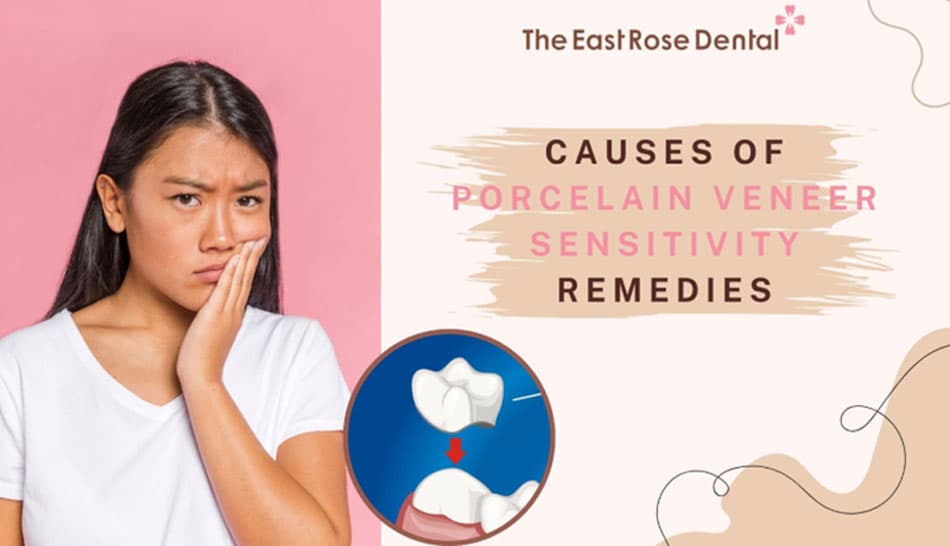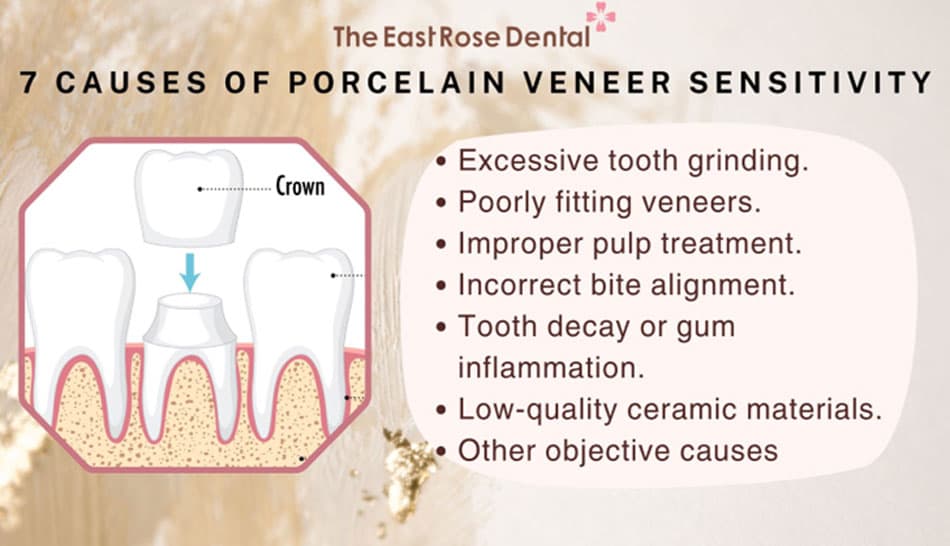7 Main Causes of Sensitivity in Porcelain Dental Crowns and How to Fix Them
Porcelain crowns provide a confident and aesthetic smile, but many people experience sensitivity after using them. So, what causes this phenomenon and how can it be addressed? In this article, The East Rose Dental Clinic will explore the causes of sensitivity when using porcelain crowns and offer effective solutions.
What is Sensitivity in Porcelain Crowns
Porcelain crowns are a common method to improve aesthetics and chewing function, but many people experience sensitivity after getting them. This sensation often appears immediately after the treatment process is completed or may occur after a short period. You may feel your teeth become sensitive when exposed to hot, cold, sour, or sweet foods. Sometimes, even cold air or a light bite can cause a sensation of sensitivity.

Recognizable signs include prolonged pain, a feeling of tooth irritation when eating or drinking, and heightened sensitivity to temperature and pressure. If not addressed promptly, this condition can lead to prolonged pain and affect eating ability and overall quality of life.
Common Causes of Sensitivity in Porcelain Crowns
Porcelain crowns are considered the perfect solution to improve your smile and chewing function, but they don't always go smoothly. Many customers experience sensitivity after getting porcelain crowns, causing discomfort and concern. So, what are the causes of this unpleasant sensitivity?

Excessive Tooth Grinding
Excessive grinding of teeth during the preparation for porcelain crowns, if not done with proper technique, can expose the sensitive dentin layer beneath the tooth enamel. When dentin is exposed, teeth become more sensitive to stimuli such as temperature, pressure, or acidic and sweet foods, causing a sensation of sensitivity. This can make eating and drinking uncomfortable and impact daily quality of life.
Fitting Porcelain Crowns
When porcelain crowns do not fit properly with the natural teeth or gums, gaps can allow bacteria and food particles to easily enter. This leads to infections, causing sensitivity and discomfort. Accumulated bacteria can cause tooth decay and gum inflammation, making teeth more sensitive. To avoid this, the fitting of porcelain crowns needs to be done accurately and checked regularly to ensure the crowns remain tight and clean.
Improper Root Canal Treatment
If the tooth pulp is not properly treated before applying the crown, or if there is undetected pulp damage, sensitivity will occur. The tooth pulp contains nerves and blood vessels, and when it is inflamed or infected, it becomes very sensitive. Placing a crown on a tooth with a damaged pulp will cause continuous pain and sensitivity, significantly affecting daily activities and oral health.
Incorrect Bite Alignment
When porcelain crowns are not properly aligned with the bite, it can cause uneven pressure on the teeth. This can lead to issues such as gum inflammation, tooth decay, or even damage to the porcelain crowns. Sensitivity can occur when the teeth are subjected to uneven pressure, especially when biting down hard on a sensitive spot.
Tooth Decay or Gum Disease
Another issue that can lead to sensitivity after getting porcelain crowns is tooth decay or pulp infection. If the crowns are not properly fitted or the quality of the cement is not ensured, bacteria can accumulate beneath the crowns, leading to tooth decay and pulp infection. This is a common cause of pain and sensitivity after porcelain crown treatment.
Read more: 5 Important Symptoms of Gum Disease
Low-Quality Porcelain Material
Currently, there are various types of porcelain crowns with different materials and prices. Porcelain of unclear origin is often prone to wear and does not provide thermal insulation when exposed to very hot or cold foods, causing tooth sensitivity. Additionally, low-quality porcelain crowns have low adhesion and are prone to falling off, posing a risk of infection and damage to the natural teeth.
Other Objective Causes
Besides the factors leading to porcelain crown sensitivity, there are other cases that can make the teeth feel uncomfortable and uneasy:
- Temporary Adjustment Period: After getting porcelain crowns, the body needs time to adapt to the new material.
- Weather Changes: Weather fluctuations, especially changes in temperature and humidity, can increase sensitivity in porcelain crowns.
- Excessive Stress or Anxiety: This affects overall body health, leading to fatigue. Porcelain crowns may also feel sensitive, causing discomfort or unease.
Read more: Do porcelain crowns cause bad breath?
How to Fix Sensitivity in Porcelain Crowns
Sensitivity in porcelain crowns can cause discomfort, affecting your daily life. Understanding this, The East Rose Dental Clinic has compiled the following methods to help you improve the issue of sensitivity in porcelain crowns:
- Examination and treatment of dental issues: Treating problems like tooth decay, gum disease, or other dental issues can help reduce sensitivity in porcelain crowns.
- Properly fitting porcelain crowns: This method is especially important if you have a habit of grinding your teeth at night. Properly fitting crowns help protect porcelain crowns from wear due to impact.
- Proper oral hygiene: Maintain daily oral hygiene by brushing your teeth regularly, at least twice a day, and using dental floss to clean the spaces between your teeth.
- Regular check-ups for porcelain crowns: This allows the dentist to monitor and address any potential issues with your porcelain crowns early on, helping to extend their lifespan and durability.
- Use specialized toothpaste: Choose toothpaste with gentle ingredients that do not contain silica, which can damage porcelain crowns. This helps limit sensitivity and discomfort.
Read more: What to choose: Porcelain crown vs Dental Veneer?
Understanding the causes of sensitivity in porcelain crowns and applying corrective measures is crucial for maintaining oral health. If you are experiencing sensitivity in your porcelain crowns, visit The East Rose Dental Clinic. Our team of professional dentists will conduct a thorough examination and propose an effective treatment plan, helping you feel comfortable and confident with your smile.
For dental checkup & consultation with dentist at The East Rose Dental
- Click here to book an appointment online directly : https://eastrosedental.com/en/contact.html
- SMS, Viber, Zalo, Whats App, Skype: +84 90 8 321 455
- Hotline: (+84)908 321 455 - (+84)931 857 885
The East Rose Dental – Since 2000 – Top 2nd - All On 4 Vietnam
➮ Clinic District 2: 166 Dong Van Cong, Thanh My Loi Ward, District 2, Ho Chi Minh City (adjacent to Vista Verde apartment).
➮ Clinic District 1: 30-36, 2nd floor Phan Boi Chau, Ben Thanh Ward, District 1, Ho Chi Minh City (at the East Gate of Ben Thanh Market).
Services
Working Time
- Monday - Friday: 08:00 - 19:00
- Saturday: 08:00 - 18:00
- Sunday closed
Contact Info
- Hotline 1: (+84) 908 321 455
- Hotline 2: (+84) 931 857 885
- Mobile: (+84) 8 3925 8778
- Phone: (+84)2 838 258 778
- info@dentalrose.net
- rosedentalclinicvn@gmail.com
 English
English  Tiếng Việt
Tiếng Việt

